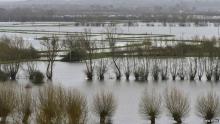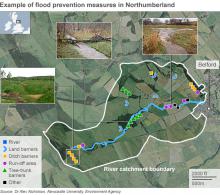The principles of Landscape Ecology have been much in the news recently with the discussion around how to manage the flooding that has occurred with the wettest January on record. After widespread calls for the dredging of rivers, George Monbiot brought the concept of upland management to prevent downstream flooding onto the wider agenda, criticising the Common Agricultural Policy for contributing to the creation of landscapes that encourage floods (see http://bit.ly/1ahDgl1).
It is easy to see how landscape change has led to an increased amount of water flowing into rivers more quickly, leading to floods. What is more difficult is to understand how to create landscapes that will prevent or reduce such floods, and more difficult further still, how to implement them.
Several studies are underway looking at management of river catchments to reduce flooding, from modelled approaches through to small-scale catchment interventions through to re-wilding. The European Adaptive Landuse for Flood Alleviation (ALFA) project led by Eden Rivers Trust is using models to plan and then implement catchment scale land use changes to protect people from flood risk due to climate change whilst maintaining and balancing other ecosystem services such as agriculture and nature.
After investigating options to manage flood water effectively, the BBC recently listed wider catchment management as the best and cheapest option, with dredging and the creation and maintenance of flood defences coming second and third respectively. There is a real opportunity for communities to make a difference and influence policy by getting involved with Defra’s Catchment Based Approach. For more information please see the Catchment Change Management Hub.

